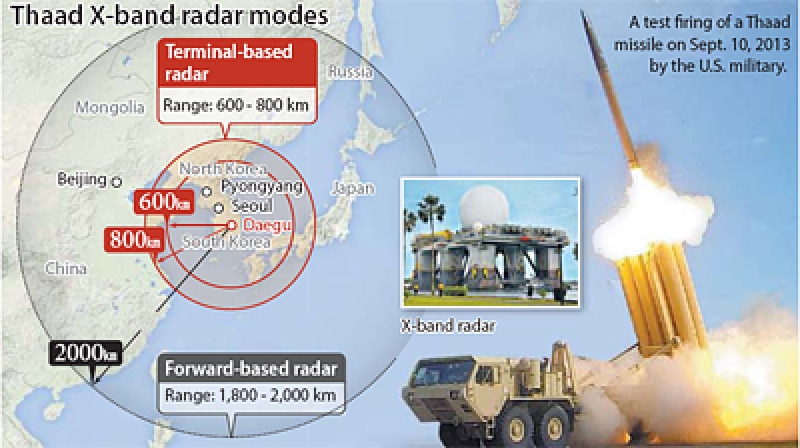China Demands “Immediate Halt” Of US Missile Shield Deployment In South Korea
ZeroHedge.com
As we pointed out earlier today, Reuters cited US military officials who said that the U.S. military’s THAAD anti-missile defense system has “reached initial intercept capability” in South Korea, although they added that it would not be fully operational for some months. Just hours after the announcement, Beijing lashed out at DC and demanded an “immediate halt” to the controversial US missile shield. China’s Foreign Ministry spokesperson Geng Shuang voiced the government’s position against the move during a briefing on Tuesday.
“We oppose the deployment of the US missile system to South Korea and call on all parties to immediately stop this process. We are ready to take necessary measures to protect our interests,” he said according to AFP, adding that “China’s position on the THAAD issue has not changed.”

THAAD missile captured during launch
As Reuters noted earlier, the spokesperson didn’t specify what “necessary measures” China had in mind. However, responding to the THAAD installation, last week China announced on Thursday that it will stage live-fire exercises and test new weapons to protect its security.
Curiously, while on one hand Beijing lashed out at the shield’s deployment, on the other, the foreign ministry expressed support for US President Donald Trump’s surprise comments that he would be “honored” to meet North Korean leader Kim Jong-Un under the right conditions.
Asked about Trump’s remarks, Geng said that China “has always believed that dialogue and consultation… is the only realistic and viable way to achieve denuclearisation.”
“We also said many times that the US and DPRK… should make political decisions at an early date, take action and show good faith so that we can create a better atmosphere for resuming the peace talks and settling the issue,” he added.
Beijing has previously expressed loud concerns over the THAAD system and joint US-South Korean drills near the Korean Peninsula, consistently urging all the parties involved to find a peaceful solution to the volatile situation in the region. Backed by Russia, it also proposed a halt to military drills in exchange for an end to Pyongyang’s missile and nuclear tests during a United Nations Security Council (UNSC) session held in New York on Friday.
Moscow has likewise opposed the stationing of the THAAD system to be an “additional destabilizing factor for the region” amid alarmingly increasing tensions. It has called on Washington and Seoul to reconsider the decision.
In response to the THAAD deployment, China has imposed a host of measures seen as economic retaliation against South Korea, including a ban on tour groups. Retail conglomerate Lotte, which previously owned the golf course, has also been targeted, with 85 of its 99 stores in China shut down, while South Korea’s biggest automaker Hyundai Motor has said its Chinese sales have fallen sharply. The THAAD deployment comes as tension soars on the Korean peninsula following a series of missile launches by the North and warnings from the administration of US President Donald Trump that military action is an “option on the table.”
Further complicating matters, Trump stunned Seoul last week when he suggested South Korea should pay for the $1 billion THAAD system. “I informed South Korea it would be appropriate if they paid. It’s a billion-dollar system,” Trump was quoted as saying in a published report. “It’s phenomenal, shoots missiles right out of the sky.”
Seoul retorted that under the Status of Forces Agreement that governs the US military presence in the country, the South would provide the THAAD site and infrastructure while the US would pay to deploy and operate it.
Meanwhile, Thomas Karako, the director of the Missile Defense Project at the Center for Strategic and International Studies, noted that South Korea’s sole THAAD battery does not quite have the range to cover the entire country. But he called it an important first step. “This is not about a having a perfect shield, this is about buying time and thereby contributing to the overall credibility of deterrence,” Karako told AFP.
“South Korea with THAAD helps communicate to the North that today is not a good day to attack. It doesn’t mean that they could not do a lot of damage — they would — but it strengthens the overall posture.”
That, however, is irrelevant to China which sees the THAAD deployment as drastically shifting the regional balance of power; as such look forward to aggressive moves by Beijing which will now seek to enforce its own national interest, even if it means dstabilizing South Korea, while boosting Kim’s regime.
